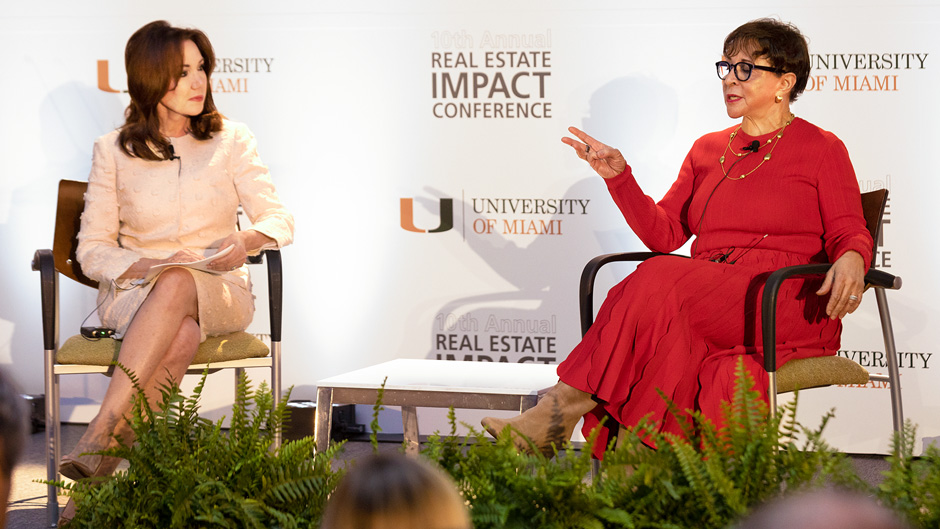Miami’s attraction as a nexus for entrepreneurs, venture capital, technology-based companies, and new industry innovations—all boosted by the pandemic—served as the foundation for the 10th edition of the Real Estate Impact Conference, this year themed “The Miami Movement: Building the Global, Entrepreneurial, Tech-Friendly City.”
Hosted jointly by the University of Miami School of Architecture, the Patti and Allan Herbert Business School, and the School of Law, the annual conference was held Friday in the Donna E. Shalala Student Center.
Jeffrey L. Duerk, executive vice president for academic affairs and University provost, highlighted the rapid adaptations of businesses, municipalities, and universities to the challenges unearthed and exacerbated by the pandemic.
“The pandemic fueled a wave of rethinking and innovation in every sector of the real estate industry,” Duerk said. “We’re happy not only to be hosting the conference today, but also to be part of that revolution.”
Laurie Silvers, chair of the University’s Board of Trustees and School of Law alumna, facilitated a conversation with Sheila Johnson, CEO of Salamander Hotels & Resorts and the only Black woman to have ownership in three professional sports franchises, for the opening keynote conversation.
Silvers, the co-founder of the SyFy Network and co-CEO of Hollywood.com, prompted Johnson to share her entrepreneurial instincts and strategies for increasing diversity through her many projects and philanthropic efforts.
Johnson, who entered the hospitality industry after her career as co-founder of Black Entertainment Television (BET), discussed the challenges she faced in building Salamander, a resort destination in Middleburg, Virginia, 45 miles outside of Washington, D.C.
“With virtually no local economy, we built from the ground up, even had to build a new water sewage plant,” said Johnson. She added that despite the poverty, lack of opportunity in the town, and the fact that she was creating jobs, she received hate mail and death threats.
She started by buying a gun shop that flew a Confederate flag, then converting it into a market. Then, in addition to building the 340-acre resort, went on to build a local performing arts center. Today, Middleburg is among the wealthiest communities in the state, she pointed out.
Johnson highlighted that among her most satisfying philanthropic projects was being able to finance the education of 50 students, covering the costs for tuition and health care. From that group, one person is now clerking with a U.S. Supreme Court justice, three are doctors, four are lawyers, and others are successful in a multitude of ways.
“They had the ability, and I gave them the opportunity,” Johnson said. “You do it here at the University as well. You don’t just write a check for education; you have to provide the safety net as well. When you invest in people, you invest in the world.”
Mark Troen, a lecturer in the University’s Master of Real Estate Development + Urbanism Program, together with students released key findings from the 2022 Real Estate Research Initiative survey. With a focus this year on the post pandemic era, the survey assessed the impact of COVID-19 on South Florida real estate.
In an afternoon session, Jason Ballard, co-founder and CEO of Icon, a leading developer of 3D construction printing technology based in Austin, Texas, emphasized the design freedom that modern technology offers and its potential to resolve the global housing shortage.
“We need to build a world in line with the things we value,” Ballard said. “A billion homes—that’s the opportunity in front of us, and we can do that in this lifetime. As builders, we help to create the world. What a high honor and privilege that is.”
In the closing keynote conversation, City of Miami Mayor Francis X. Suarez and Sandeep Mathrani, chief executive officer of WeWork, outlined what the city has done, especially in the wake of the pandemic, to spur the “Miami Movement” and enhance its attraction as a tech center.
For the students in attendance, the panelists offered career advice.
“Find something that you love to do and know that there are different stages to your life—early, middle, and late,” Mathrani said. “No need to focus early in your life on money. Seek out experience and don’t be afraid to pivot. In mid-life, you may marry and have children—that’s a time to increase your earnings. Later in life is the time for giving back.”
Suarez noted that from a job perspective there’s a difference between money and value. “A job that pays less, such as working in government or for a mission-driven company, may be creating more value in your life,” he said.
He encouraged students to develop hard and soft skills and to know that companies need both engineers and those who are talented in marketing, sales, and communication.
“And embrace the disruption,” Suarez urged students. “We are living in a disruptive world—and that will grow continually and exponentially.”

